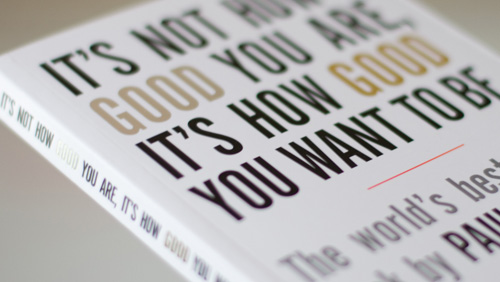In this week’s episode of Pokerography Lee Davy takes his third and final look at the Paul Arden classic on creativity and excellence, It’s Not How Good You Are, It’s How Good You Want to Be, and pulls another four gems from its fertile soil.
Welcome back to the final instalment of Paul Arden’s classic on how to be a creative thinker, brand, or company – It’s Not How Good You Are, It’s How Good You Want to Be and how we can use his wisdom at the poker tables.
 1# It’s Not What You Know; It’s Who You Know
1# It’s Not What You Know; It’s Who You Know
Ok, it’s hardly innovative advice, but I liked the way Arden put his little spin on this pearl of wisdom.
Consider, two professional poker players, both ambassadors of an online poker room. The one with the titles and the Top #10 place in the Global Poker Index (GPI) rankings, buries his head into his poker, and works as hard he can. He plays thousands of hands online and visits all of the tournaments. He wins a lot of events. He believes he is providing value for his online poker room by working his butt off.
The second player has no titles and is so far down the GPI rankings you will never find him. This guy also works his butt off, but instead of playing thousands of hours, like the first guy, he opens up a Twitch account and starts playing while engaging with his fans.
He has little business cards printed out that advertise both the brand he is representing and his Twitch channel. When he is at live tournaments, he is constantly talking to recreational players asking what problems they have playing poker at a grassroots level, handing out business cards, and providing solutions via his Twitch channel, or sending feedback back to his lords and masters.
Who do you want to know?
2# Don’t be Afraid to Work With the Best
If you want to make your way up the poker ladder and one day be a professional or semi-professional player, then you are going to have to find a coach.
And don’t think this advice is only poker related.
Relationships.
Money.
Sex.
Exercise.
Nutrition.
There is comfortableness in finding a coach you gel with. You feel at ease; confident to speak your mind; you feel respected, and you look forward to your lessons.
Imagine, the reverse was true, and the very best coach in the business that you can afford is a right cock. You don’t gel. You don’t feel respected. You don’t look forward to your sessions.
How do we choose?
Do we choose the easy life?
Or do we go for the win no matter how difficult the journey may be?
3# We Are All Selling
PokerStars employees are putting colanders on their heads and diving into the trenches. Angry and frustrated players are throwing grenades from all over the world.
Where is the fightback?
Who is returning fire?
It’s at times like these when people start to consider selling as a sleazy practice. They become mute. They wear the patch; they promote the next great marketing ad by retweeting to their masses. But they don’t sell because they are too embarrassed.
Paul Arden points out that everyone sells.
Gary Vaynerchuk calls it hustling.
I am using words to sell this article. Yesterday, my dentist caressed my chin and told me to give my mouth a break as a way of selling his services. The person who just knocked on my door to talk to me about God is a salesperson, as is the person on the street corner begging for a coin to feed his dog.
Selling and advertising is a part of life, and so you should get to it, especially when your company needs you the most.
4# Jumping to Conclusions
I can’t wait for my six-month-old daughter to start talking.
Why?
Why?
Why?
I’m not asking myself why I can’t wait for her to start talking. But that’s the one word I am going to hear the most, and do you know what, I love it because it means I am going to learn more than at any other period in my life, other than 16-years ago when my first child peppered me with the same word.
Why?
I love it.
At the back of Paul Arden’s book, there are a series of his favourite quotes.
Here is one of them.
“Some people take no mental exercise apart from jumping to conclusions” – Harold Acton.
Very often I will send hand histories to professional poker players to seek feedback for publication. THE VERY BEST always ask me why? And very often, I don’t have the answer.
Of course, had I been half decent, I would know the answer.
I used to have a poker coach called Xavier Jutras. He taught me for free because I was broke. He was a lovely guy. He kept asking me ‘Why?’ and I hated it. It made me feel inferior, stupid, and inadequate.
“Why did you bet $400, why not $300, or $500?”
But these questions – understanding the why – is a critical part of becoming a great poker player and one of the reasons I get paid to write this instead of playing poker.
I don’t think about ranges; I don’t consider my story, I just get to the river and jump to the obvious conclusion.
“He has pocket tens, I call.”